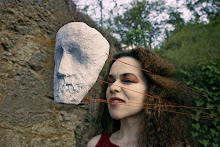long, white chairs lined her deck, putrid smoke exited her exhausts.
When I was fifteen, she was taken to the windward side of the
island and sunk. They welded holes in her hull and let the
bottom and stern touch sand. She stayed on Mt. Wynne’s black
shore for years becoming a haven to fauna until she was labeled
defunct, an eyesore. They took her out to sea and buried her
along one of the deepest crevices.
In the year of our Lord, 1985, five years after I was born, my father
put me on the counter of his first ship, M.V Pattree, which had a
map affixed to its surface. It was blue and white, its lines obscured
by the plastic sheeting laid over it to protect it from the elements,
it’s edges curled from the humidity. White turning yellow: faded,
crinkled and salty. The bridge affixed with the permanent scent of
diesel, rust and engine oil coursing over the cabin’s façade and
seeping into the very composition of the lacquered plywood and
hard vinyl changing its instruction, its nature.
We were out to sea, tossed between God’s billowing waves, back and
forth; into and out of the strange aqueous that was no longer sky
blue and placid, but angry, vociferous and unforgiving. It was dry
season because that was the only time my father would let her walls
protect us, some myth about the Inter-Tropical Convergence Zone,
convection and wind pressure travelling west off the coast of Africa
aligning to make the conditions perfect. The converging tides pulling and
pushing us North, South, East and West, all at once.
This undertow ruptures the delicate history of the archipelago,
redistributing and corrupting its parts, the sea’s violence pronounced,
piercing and omnipresent. It consumed my ancestors in a gulp over
a century and a half ago, left them like beached whales stranded
on small topographic slippages. Barren and bare, they dispersed.
Journeyed to find homes that would occupy the abandoned cavity left by
the surge of the sea. Ravenous, they scoured lands putting roots down;
they occupied the periphery of expanding shores, of protected ports and
harbours and of elusive ground.
I am where I come from, nine degrees north of the Equator. I speak the
language of this place. The specificity of language is important to the
region; it is the way we come to know ourselves through the ritual of
an aural and spoken (oral) tradition. The function of memory within
these constructs becomes distorted, maze-like, an amalgamation
of the past’s past. Through synapses, chemistry collides with image,
sound, taste and touch; Iit is re-experienced as confusion, as
displacement. I try to locate myself within the time line of the region,
within the stories that spill from elder lips; always I am confronted
with a gap, a space that seems impossible to reconcile.
I attempt to reassemble, to put to order things that seem out of place.
It becomes an opportunity to confront memory, its disobedience,
half-truths and exaggerations. The fan appears, the fan of memory
that Walter Benjamin describes, the one that spirals out from its
circumference into forever. Along its rungs questions multiply and
truth evades. This spiral has no folds, no folds to lift up and push oneself
against, it is smooth, forever retreating into the beyond. The possibility of
dissection, of splitting the helix, its tangent line and angle becomes
treacherous.
Thus, it races past me, beyond my perception into that infinite space
where language becomes the fight. The fight is synonymous with my
relationship to reality. Pen to paper, in binary, within code, shrouded
within language, the fight manifests itself as fists and blows. Instead
of the world being knocked off its course, it is I who am dislodged.
Exiled. Through this controlled retreat into the past, I explore the
fragments of souls given voice again to reflect on territory, on the encircling
salt that courses through veins, and on the ever slowly travelling being
back and forth wondering and wandering within waves.








